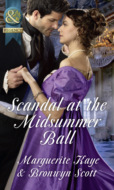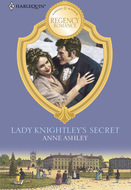Kitap dosya olarak indirilemez ancak uygulamamız üzerinden veya online olarak web sitemizden okunabilir.
Kitabı oku: «The Other Bride»
Heavens, what a man!
Before she could gather her scattered wits, his gaze raked over her with insolent thoroughness.
“You’re very lovely, but I don’t recall asking for your business.”
Phoebe gasped at the man’s effrontery. Her hands balled into fists, but she strove to control her temper.
So this was the great Gabriel Cutter. The same man who had decided to deny the mail-order brides their rightful passage on his train.
Her anger seethed anew.
“It is I who has business with you, Mr. Cutter.”
He didn’t seem impressed by her statement. Instead, he began circling her, scrutinizing every inch of her frame in a way that reminded her of a hungry lion she’d once seen being fed at the London Zoo.
The Other Bride
Harlequin Historical #658
Praise for Lisa Bingham
“Lisa Bingham breathes life into your wildest fantasies!”
—Romantic Times
“Lisa Bingham captures perfectly the spirit of late nineteenth-century America.”
—Affaire de Coeur
“Her characters are delightful, full of dimension and individuality and make you laugh, cry and leave you sleepless while you try to read just one more page.”
—Affaire de Coeur
#655 BEAUTY AND THE BARON
Deborah Hale
#656 SCOUNDREL’S DAUGHTER
Margo Maguire
#657 WYOMING WIDOW
Elizabeth Lane
The Other Bride
Lisa Bingham

MILLS & BOON
Before you start reading, why not sign up?
Thank you for downloading this Mills & Boon book. If you want to hear about exclusive discounts, special offers and competitions, sign up to our email newsletter today!
Or simply visit
Mills & Boon emails are completely free to receive and you can unsubscribe at any time via the link in any email we send you.
Available from Harlequin Historicals and LISA BINGHAM
The Other Bride #658
Other works include:
Harlequin American Romance
Nanny Jake #602
The Butler & the Bachelorette #635
The Daddy Hunt #651
Dana and the Calendar Man #662
The Princess & the Frog #692
And Babies Make Ten #784
Man Behind the Voice #835
Twins Times Two! #887
Harlequin Intrigue
When Night Draws Near #540
Contents
Prologue
Chapter One
Chapter Two
Chapter Three
Chapter Four
Chapter Five
Chapter Six
Chapter Seven
Chapter Eight
Chapter Nine
Chapter Ten
Chapter Eleven
Chapter Twelve
Chapter Thirteen
Chapter Fourteen
Chapter Fifteen
Chapter Sixteen
Chapter Seventeen
Chapter Eighteen
Chapter Nineteen
Epilogue
Prologue
Devon, England
April, 1870
“Louisa! Louisa, where are you?”
The call was distant, urgent, riding on the back of a gusting wind that threatened to obscure the query altogether.
From her hiding place beneath the willows at the edge of the graveyard, Louisa Haversham debated whether or not to respond. The storm would be here any moment. If she waited long enough, the rain would come and the student who had been sent to find her would balk at entering the cemetery, and return to school. Then she would be alone once again.
“Louisa! Mr. Goodfellow and Mrs. Pritchard are looking for you!”
Louisa grimaced. She didn’t really care if her absence angered Mr. Goodfellow, the owner of the school, or Mrs. Pritchard, the headmistress. They might scold or keep her from her meals, but they wouldn’t dare to exact a punishment harsher than that. Not when her father was their principal benefactor. In her years with the school, Louisa had been anything but a biddable student. She’d been an angry, hurt child when she’d first arrived, and her temper hadn’t improved much over the years.
“Lou-i-sa! Your father is here!”
Several seconds passed before the meaning of the words permeated her brain. Jumping to her feet, she scrambled in the direction of the school, racing pellmell through the sodden grass, until she arrived breathless and disheveled at the side door.
Mrs. Pritchard waited for her there, her body quivering in displeasure. “Into the chapel,” she snapped. “Your father is waiting.”
Louisa hurried to comply, her knees growing weak with anticipation and anxiety. Her father was a rare visitor to Goodfellow’s and his sudden appearance didn’t bode well. The truth of the matter remained that Oscar Haversham despised Louisa and had despised her from birth. She hadn’t been a boy and had therefore proved useless to him.
But the last laugh is on you, Father, a tiny voice within her whispered. Her father, who had married five times in an effort to produce a son, would soon die “without masculine issue.” The ravaging effects of consumption would claim him soon enough.
The irony wasn’t lost on Louisa, nor could she ignore the tragedy of the situation. She was the only child of one of the wealthiest men in England, yet she’d lived a life of virtual poverty within the walls of Goodfellow’s School for Girls. Only at Christmas-time was she permitted to return home—a fact that had been more of a burden than a delight. For seven days, she was dressed in clothes and jewelry chosen by her father to impress whatever business associates had been invited to Haversham Hall. She was expected to keep to herself, refrain from speaking, and appear suitably grateful for the scraps of attention he threw her way. Then, as soon as the New Year dawned, she was hustled back to Goodfellow’s posthaste.
So why was her father here now?
Hearing the distant sound of voices, Louisa froze. Could she dare to hope that she was about to leave Goodfellow’s School for Girls and return home for good? Or was her father on his deathbed? Was he frantic about the inevitable disbursement of his title and the bulk of his business empire passing to a distant male cousin rather than a son?
Louisa wove her fingers tightly together to still a burst of trembling. Her panic grew so intense it nearly choked her. Damn her father for his meddling, for his hard-heartedness. But most of all, damn him for his inability to love her for something she could not change—being a female. If she ever managed to get free of his clutches, she would never allow another human being to have such control over her.
Especially not a man.
Louisa was but a few feet away from the chapel when the door suddenly swung wide, revealing the sour face of Mr. Goodfellow.
“In here, child,” he said curtly, clearly holding his tongue to avoid criticizing her in the presence of her father.
Moving on quaking limbs, Louisa crossed the threshold. In an instant, she took in the tall figure of the local magistrate, her dour cousin Rodney, her father in his rolling chair, and an unknown woman in black, her face obscured by a mourning veil.
Louisa’s heart thumped in her breast.
What was happening? Why had her father come to Goodfellow’s—and why had he brought Cousin Rodney and another woman with him?
As if sensing her thoughts, her father, the eleventh Marquis of Dobbenshire, spoke. “You’re to be married by proxy,” he rasped, his voice hoarse and quavering like a man of eighty rather than his mere fifty years. “Your husband-to-be, Charles Winslow III, is a business associate of mine in Boston. He was unable to make the crossing—” Haversham paused, struggling for breath “—so he sent word…that you were to be married anyway, with Rodney standing in as the groom.” Again he paused, and the pallor of his skin alarmed even Louisa. “At the end of the week, you will board a ship for America. Once there…you’ll have a proper church wedding.”
Married?
By proxy?
Ice began to seep into her muscles. Her mind worked frantically, trying to grasp the meaning of her father’s pronouncement. But with each inescapable tick of the clock, she was able to grasp only one fact.
Her father was a brilliant man. The last time she had seen him, he’d railed at the fact that his wealth, power and title were to be passed on to an “ungrateful cousin” rather than his own flesh and blood.
But by selling his daughter to the highest bidder—and she had no doubts that was exactly what he had done—he could pray that he would soon be supplied with the heir he craved.
A grandson.
Louisa opened her mouth to protest, but all sound choked in her throat before it could even be uttered. It was clear from the jut of her father’s chin that this marriage would occur, one way or another.
Run! an inner voice urged.
But where would she go? How could she ever hope to escape? She was totally at her father’s mercy. She had no money of her own and no references that could lead to employment. Furthermore, at the first hint of disobedience, her father would see to it that she was locked up—either here at school or a convent. If she managed to elude him, his money and power would provide the means for her to be found.
Hope faded like smoke rising from a snuffed candle. She would not escape this marriage. She would exchange her prison here for one in America, with a stranger of a husband as her keeper.
Her father made a brusque gesture toward Rodney and the magistrate. “Let’s get this…over with.”
Numbly, Louisa took her place. In a daze, she heard the magistrate speak.
“Dearly beloved…”
Was there no way out of this? None at all?
But as she scrambled to find a way to derail her father’s machinations, her only solace lay in the fact that this marriage by proxy would offer her time.
Time for what? Another solution? And what would that be?
Your new husband won’t have seen you, her inner voice whispered again. Someone could take your place.
The thought was so sudden, so startling, that Louisa jerked.
Rodney, who had been asked to take her hand, took the movement for an attempt to pull back, and tightened his grip until her bones felt as if they would crack.
Could she do it? Could she find someone who would be willing to marry a stranger and assume her identity in exchange for…
For what?
Her inheritance. Her title.
But who would that woman be? Who would be willing to submit to a loveless marriage? Worse yet, Louisa would have to find someone who had a passing likeness to her in case her father had described her in his correspondence.
“Louisa!”
“Yes?” The word was spoken before Louisa knew what she’d done. Too late, she realized she’d been asked if she would “take Charles Winslow as her husband.”
“I now pronounce you husband and wife.”
Louisa’s thoughts suddenly scattered. Shocked, she realized that the ceremony was over and she had barely heard a single word.
“Sign the papers, Louisa,” her father panted. “I want to get out of this…dank air before it finishes me. Then I’m off for an…extended stay in Italy to improve my health.”
It was the magistrate who said to Louisa, “I hope you will be happy, Mrs. Winslow.”
Winslow. Louisa Haversham Winslow.
The magistrate took her hand. “Don’t worry, dear,” the man said with a reassuring pat. “I know a woman of your background balks at the informality of a civil ceremony. But as your father has said, once you’re reunited with your husband, you’ll have a church wedding with all the trimmings.”
Reunited? So the magistrate had been led to believe that she had met Charles Winslow.
“Sign the papers, Louisa.”
Moving on wooden legs, Louisa crossed to a side table set with a sheaf of documents, an inkwell and a pen.
Dear God, help me. Help me to find a way out of this. Help me to find someone who might be willing to take my place.
When she’d finished, her father eyed her with disdain. Clearly, he still wished she’d been a boy.
He held out an imperious hand to his valet. Immediately, the servant crossed to Louisa, handing her a hinged, wooden box. She opened it and gasped, recognizing several pieces of her mother’s jewelry as well as a heavy signet ring with the family coat of arms.
She gasped. The gift was so unexpected. Her mother’s jewelry!
“Father, I don’t know what to—”
He cut her off.
“I won’t have you besmirching the family name with an absence of jewels. I’ve only provided you with a few items of lesser value. The rest will be given to you or your heirs upon my death.” He paused. “If I feel you deserve them. I’ve provided you with a good husband, Louisa. Be grateful.”
She clamped her teeth together, wishing she had the courage to speak her mind about her father’s “arrangements.”
“Charles is a solid business associate. He’ll make your life…an easy one.” Her father coughed, his whole body jerking with the effort. When he’d managed to catch his breath, he added, “He asks only that you…supply him with a male heir.”
Charles wished for an heir? Or did her father?
As if sensing her thoughts, her father’s narrowed his eyes and lowered his voice to a chilled sliver of sound. “Take great care as you embark on this life, Louisa. Charles walks in…important circles. As his wife, you must guard every word, every deed. If you prove…an asset to him, I’m sure your life will be a happy one.”
Louisa knew her father wasn’t overly concerned about her emotional welfare. Instead, he was offering her a none-too-subtle warning to behave.
“Charles has made great concessions on your behalf.”
Again Louisa bit her tongue. In her opinion, Charles Winslow had done little more than instruct someone else to take his place.
Her father’s voice grew brittle and his gaze flicked in the direction of the magistrate. “He has supplied you with…a wardrobe befitting your role as his wife. Traveling trunks…feminine frippery…”
Lord Haversham held out an imperious hand to the lady who had been waiting in the shadows near the door. “This woman…is also on her way to America, where she will be wed. Charles and I have arranged for her to be your companion.”
At that moment, the woman stepped more clearly into the light surrounding the altar. The glow pierced the folds of the veil that draped from her mourning bonnet, and a gasp of surprise lodged in Louisa’s throat.
No. It couldn’t be. God couldn’t have answered this one prayer when he had ignored so many others.
But as the woman lifted the veil and stopped mere feet away, one inescapable fact lodged in Louisa’s brain.
She looks like me.
Chapter One
New York
June 1870
Gabriel Cutter caught the line being thrown over the bow of the ship. Tying it to the skiff, he clambered up the rope ladder to the deck and accepted a helping hand.
“Gabriel Cutter?”
“Yes.”
“Follow me, sir.”
Gabriel did as he was told, being careful to keep his hat pulled low and his face averted from a striking pair of redheaded women who were standing nearby. He had no wish to capture the attention of anyone on board. And if he were to be seen, he didn’t want anyone to remember him too clearly.
The sailor led Gabriel to the lower cargo decks, then motioned to another figure waiting in the shadows. Without another word, the sailor withdrew.
“Gabe Cutter?” the second man asked.
Taking a leather folder from his pocket, Gabriel held his Pinkerton identification card beneath the glow of a lantern.
The man heaved a relieved sigh. “It’s good to finally meet you, sir.”
Gabriel extended his hand in greeting. “I appreciate the work you’ve done so far, Roberts.” Lloyd Roberts had been one of the Pinkertons assigned to guard the shipment during the crossing.
“I’ll be happy to have you take control of the shipment, I can tell you,” Roberts said, leading Gabe to a cargo hold, and from there to a stack of crates that had been under constant guard.
“Sir.” The acknowledgment came from a second ruddy-faced guard, who stepped from the shadows where he’d been hiding. The fellow was little more than a kid.
Gabriel grimaced. He had requested that the Pinkerton offices give him experienced agents for this assignment. They’d sent him a boy who was barely out of short pants.
Gabe supposed he shouldn’t be surprised by the home office’s decision. He’d grown used to fighting for every concession he could get. Despite Gabe’s abilities as an agent, there were too many men above him who remembered him from the war. It wouldn’t matter that Gabe had a sterling reputation with the Pinkerton Agency. The memory of his wartime desertion would outlive any successes he might have had in the succeeding years.
“What’s your name?” Gabe asked brusquely.
The boy blinked and shifted uncomfortably beneath Gabriel’s narrowed glare.
“P-Peterson, sir. Luke Peterson.”
“How long have you been with the Pinkertons?” Gabriel asked. A brief glance at the boy’s grip on his rifle confirmed that he was quaking.
“Th-this is my first job.”
Gabriel took a deep, calming breath, then asked, “Do you know what you’re doing?”
Peterson blinked, clearly confused by the question. “I—I’m guarding these crates.”
“Why?”
The kid sent a pleading glance toward Roberts. “B-because they told me to.”
At the frank answer, Gabriel’s lips twitched in the beginnings of an unconscious smile, but he quickly controlled the impulse. It wouldn’t do for the boy to grow too relaxed around him.
“There may be some hope for you, Luke. Continue to do as you’re told and we’ll get along together just fine.”
The boy offered him a shaky grin. Then he drew to attention as if remembering that the job was a serious one and Gabriel…
Gabriel had a reputation of being a bastard.
Gabriel was fully aware of his reputation. He was a tough taskmaster, demanding infinite obedience from his men. Nevertheless, it wasn’t his role as a senior Pinkerton agent that alarmed Luke. Gabe could gauge the moment Peterson remembered everything he’d been told. Bit by bit, the warmth faded from the boy’s eyes, to be replaced by a horrified curiosity. Gabriel could almost read Peterson’s thoughts.
Was this Gabriel Cutter? Was this the man accused of desertion?
“Any problems?” he asked, turning his attention back to the elder Pinkerton.
“None. I doubt anyone even knows we transported the shipment of gold.”
“Don’t be so sure.” Gabriel’s tone had a hard edge to it.
To date, four payroll shipments destined for the Overland Express had been stolen en route to the construction sites in the Oregon Territory. The laborers were growing restless and threatened to revolt if they weren’t paid, leading Josiah Burton, the owner of the Overland Settlers Company, to enlist the aid of the Pinkertons in transporting the latest shipment.
“Stay on your toes. There have been four previous robberies. Whoever is responsible will be watching, have no fear.” Gabriel nodded in the direction of the shipment. “You’ll be relieved of your posts in an hour. I’ve got rooms reserved for you at the Golden Arms Hotel under the names Walters and Williams, but I’ll expect you to be here when the ship docks in the morning. At that time, you’ll meet up with the rest of the crew and see to the transfer of the crates. You’ll have little more than a few hours to rest and relax tonight, so get some sleep. You’ll need it.”
Peterson offered a muffled, “Yes, sir.”
Roberts merely nodded.
“I’ll see you tomorrow afternoon then.”
As he turned to leave, Gabriel motioned for Roberts to follow. Once they were out of earshot, he asked, “How’s the boy?”
“He’s young, but he’s eager to please and he’s capable. He served with the First Pennsylvanian Battalion during the war.”
Peterson couldn’t be more than nineteen, yet he was a veteran in a war that had ended more than five years before. The fact didn’t surprise Gabriel. There had been so many boys who had run away from home to join the cause—either by serving as drummers or lying about their ages so they could enlist in the infantry.
“Keep your eyes open, Roberts, for your sake and the boy’s. He might have served in the war, but his hands are sweating—and we haven’t even docked yet. Veteran or not, he’s too wet behind the ears for my taste.”
Gabriel waited until Roberts had returned to his post. Then, tugging his hat more firmly over his brow, he wound his way through the narrow corridors to the deck again.
The sooner he left the ship, the better.
Gabe had barely climbed to the first class cabins when a door a few yards away suddenly opened.
The figure that emerged was clearly that of an aristocrat.
Immediately, he recognized her as being one of the women who’d been on deck when he’d climbed aboard. She was willow slim, with red-gold hair coiled in an artful arrangement that did nothing to disguise the natural curls that many women would have found “unfashionable.” Her indigo silk gown was simple, with stark, tailored lines. Except for a small amount of lace that circled the collar, and an elaborate strip of pleats at the cuffs, her bodice was unadorned with the usual manner of feminine frippery. The lines were tight and form fitting, ending at a skirt festooned with elegant swags of fabric that puffed over a full bustle.
In all, Gabriel wasn’t prone to admiring the latest fashions. But as this woman turned, offering her back, Gabe acknowledged for the first time that there was one clear advantage to the exaggerated silhouette. Indeed, as she moved and the bustle twitched, he found himself infinitely aware of the sway of her hips and the tiny circumference of her waist. To his disgust, he felt an immediate masculine reaction.
The thought caused him to draw back and curse his own wayward imagination. Damn it, he was exposed here in the corridor. If the woman were to turn around, she would see him clearly—and such an eventuality could lead to complications he didn’t want to envision.
But even as he berated himself for the waywardness of his thoughts, Gabe’s eyes slid back to her again.
She was a striking woman, in his opinion—although some might consider her a bit on the plain side with such pale features and that red hair. Moreover, there was a jut to her chin that showed a streak of obstinacy.
Or was it passion?
Gabe took a step forward as if to follow her. But in that same instant, another shape appeared in the doorway—another redhead, this one smaller and more voluptuous. A sister, perhaps? The similarities between the two women were astounding.
“Louisa?” the woman called from the doorway. “Don’t you think you’d better take your shawl? It’s chilly outside.”
“I’ll only be a moment, Phoebe.” The one named Louisa turned, and Gabriel shrank deeper into the shadows, praying that she wouldn’t look in his direction. “I left my drawing book and my shawl on deck. I’ll return directly, I promise.”
For one more moment, Gabe was able to study the woman wearing sapphires and silk—the elegant contours of her profile, and eyes that were a deep, stormy blue. Then the smaller woman closed the door, and Louisa turned, hurrying toward the companionway in a rustle of skirts.
Not really understanding his own motives, Gabriel followed her. He wanted—no, he needed to be near her for a moment longer. And even though caution nagged him to return to his duties, he trailed her as she made her way into the chill evening air.
All too soon the woman found the items. Shrinking into a space created by two stacks of crates, Gabe grew still, knowing that she would return to her cabin as promised.
But to his infinite surprise, the woman didn’t immediately go below deck. Instead, she tipped her head up to the stars as if she could feel their scant light upon her cheeks like the warmth of the noonday sun. Then, wrapping the shawl around her, she gripped it tightly to her chest.
“Tomorrow,” Gabriel heard her whisper. “Tomorrow, I will be free.”
Free? He frowned. Free from the ship? Or something more?
Gabe scowled at his own musings. What had come over him? He didn’t have time for any of this. Tomorrow morning, the dummy shipment and the actual payroll would be transferred onto the boxcars bound for California. Before that could happen, he needed to brief his men, review guard schedules, meet with Josiah Burton.
Flipping his collar up around his chin, Gabe shook away the invisible sensual threads that had begun to bind him. He had a job to do, and he was determined to do it well. His name was at stake. His reputation. Moreover, he wasn’t the kind of man to keep company with someone of “quality.” He’d grown too crass and coarse for anyone from such rarified air—and he was honest enough to know he was the sort of man that mothers warned their daughters about.
But even as he would have retreated toward the rope ladder, he hesitated. A gust of wind brought a hint of sound that sounded suspiciously like…
Weeping.
Gabe would have been the first to admit that the sound of a woman’s tears generally tended to drive him in the opposite direction. But there was something about the noise, about the efforts Louisa exerted to keep her emotions private, that caused him to hesitate.
Hairs prickled at the back of his neck and he cautiously searched the darkness. What had happened? Was she in trouble? The woman had altered from joy to sadness so quickly that something must have affected her deeply. A terrifying memory, perhaps?
His jaw clenched.
He knew all too well how flashbacks from the past could arise without warning. He’d become an expert on such matters. Over the years, he had discovered that a hint of spring lilacs could wipe away the intervening years so that he was standing again in the orchard, staring down at the sprawled, battered bodies of his wife and son.
No. He mustn’t think about that now. He had to keep his mind on the job, only the job.
But as he took a step backward, he looked at the woman in blue and a wave of protectiveness surged within him. If she were being threatened or intimidated, he would…
What?
What would he do? He didn’t know the woman and he had no business interfering in her affairs.
Gabe’s hand tightened around the butt of his revolver and he hardened himself to the sounds she made. Blast it all, he was a man who prided himself on finishing a job without interference. If that were true, why had he allowed himself to be so easily distracted now, at a point in his career where one false move could mean the end of everything?
The woman’s sobs intensified, but Gabe steeled himself against their appeal for help and steadfastly stared at her back. He had troubles of his own to tend to. He didn’t have time to worry about those of a stranger.
And yet…
Damning himself for his weakness, he didn’t walk away. He couldn’t. Instead, he stepped forward, slowly, quietly.
Although Gabe could never have been accused of rescuing damsels in distress in the past, he reached into a pocket, removing a clean handkerchief. Shaking it free of its folds, he extended it to the woman over her shoulder.
She started, clearly unaware of his approach. But when she would have turned, he took her shoulders in his hands, forcing her to remain with her back to him.
“No. Don’t,” he said, so quietly that he wondered if she would hear. “Let the interference of a stranger remain just that…the actions of a stranger.”
He didn’t know where the words came from. His voice was gruff, telling. Kindness had become a foreign emotion to him. For so long he’d been angry at the world and most of the people who inhabited it. And yet at this moment, with this woman, he found his anger slipping away, leaving him bereft, hollow, and infinitely sad.
Long, long ago, in another lifetime, his wife had hated to be caught crying—and uncomfortable with such womanly emotions, Gabe had been happy to let her vent her grief in private. Now, years later, he didn’t think that he could bear to see this woman’s cheeks stained with tears. He didn’t want to remember her that way. Days from now, months, years, he wanted to recall the way he’d first seen her in the corridor.
Beautiful.
Happy.
The woman sniffed, taking the handkerchief. “Thank you. I don’t know what’s wrong with me. I’m not normally so…what I mean is I…”
Her hand waved in the air, a bright patch of white from his handkerchief and a darker, eloquent shadow caused by her gloves. Inexplicably, Gabe wished that her hands were bare. He wanted to see the velvety texture of her fingers. From his vantage point behind her, she was little more than a shadow. Only the lighter patch of her hair and a brief glimpse of the skin at the nape of her neck helped to remind him that she was flesh and blood.
Gabe’s heart floundered sluggishly in his chest. Years of avoiding even the barest hint of attraction seemed to dissolve, leaving him aching with loneliness. He suddenly felt like a shell of a man. The anger that he had carried with him left a taste on his tongue like ashes.
Dear God, what had this woman done to him? In the space of a few minutes, she had exposed his life for what it was—an endless struggle to forget. Nothing more. Nothing less.
But could it ever be anything more? He’d had his one chance at happiness, and through his own carelessness, his wife and son had died. It was his fault that he hadn’t sent them away to safety during the war. He should have forced Emily to leave their farm—or at best, should have ensured she’d had someone with her for protection.
A breeze caught at the tiny curls that had escaped the coils of the woman’s hair. The scent of lilies wafted around him, making him ache with sadness.








